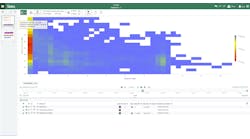Last December, the final dissolution of the GE Fanuc Automation Corp. Joint Venture took place. As part of that announcement, Maryrose Sylvester, president and CEO of the GE portion, which will now be known simply as GE Intelligent Platforms (GEIP) said, "We will continue to invest in our product and solution platforms that allow our customers to compete and succeed in a challenging economy."
One of the first actions of the new company was forming a new collaborative agreement with Finnish process automation system vendor Metso, in which GEIP will resell the Metso FieldCare device asset management solution. Adding a device asset management capability to the existing Proficy Process Systems process control solution would be regarded by many as a necessary precondition for GEIP to be regarded as a serious contender in the process automation system marketplace. "When you consider a process plant, there are hundreds or even thousands of devices such as valves, pressure sensors and temperature sensors that are used to control the process," said GEIP's Process Solutions general manager, Steve Ryan."Failure on one of these devices can lead to lost production. Knowing, not just assuming, that process equipment is operating properly is imperative. It's not a nice-to-have—it'is an operational requirement."
Single Tool
FieldCare provides one tool to manage process devices and disseminate information about them via web-enabled interfaces across the user's network in real time. The need for vendor-specific tools is eliminated by being able to show both standard configuration parameters and device-specific functions, with a beneficial impact on all phases of the plant lifecycle. Thus, the ability to download the configuration, calibration and tuning information needed to set up each plant device is a significant advantage at commissioning, while continuously monitoring the condition of each device allows the implementation of a predictive maintenance regime and the elimination of unscheduled downtime. Similarly knowing which devices will require service allows the necessary resources to be made available ahead of a planned shutdown.—reporting by Andrew Bond.



